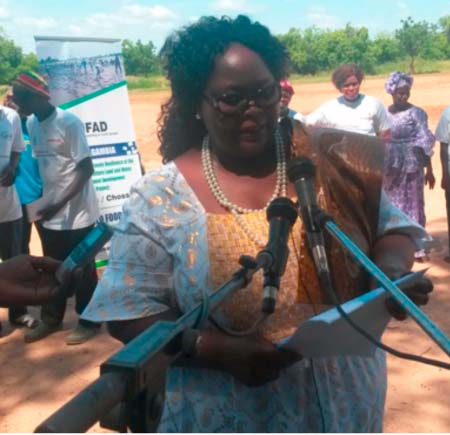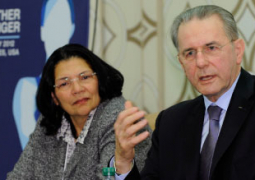
The
Food and Agriculture Organization (FAO) of the United Nations in collaboration
with the Gambia government, farmer organisations, civil society organisations
and UN System in The Gambia Saturday 16 October 2016 joined the rest of the
world to celebrate World Food Day in Janjangbureh, in the Central River Region.
The
theme for this year’s celebration is: “The climate is changing. Food and agriculture
must too.”
The
day provides an opportunity for all stakeholders to refocus efforts and
partnerships as they work towards mounting an immediate and comprehensive
response to climate change.
In
delivering a statement on the occasion, FAO country representative Dr Perpetua
Katepa- Kalala said this was a day of action against hunger.
World
Food Day 2016 is not a day for reflection; it is a day for action, she said,
adding that, this year, World Food Day was devoted to analyzing how food and
agriculture should evolve in order to face the impacts of climate change.
FAO
country official also indicated that Rural Women’s Day is celebrated every year
on October 16 to honour and appreciate the role of rural women in society.
It
recognises rural women’s importance in enhancing agricultural and rural
development worldwide, she said.
According
to her, this year’s theme for the World Food Day was also highly relevant to
the sustainable enhancement of rural women’s livelihood.
Dr
Kalala further stated that the threat of climate change continues to mount
every single day, and global average temperatures are increasing and new
records are registered almost every year.
Kalala
also said climate change is a fundamental threat to global food security, and
it is already undermining crop yields in many parts of the world.
Rising
temperatures, changing rainfall patterns and extreme weather events are
affecting their ability to produce the food needed.
She
said the intergovernmental panel on climate change predicts that yields for
staple crops such as wheat and maize could decline dramatically by 2050.
The
most vulnerable people are the world’s poorest, 70 per cent of whom depend on
subsistence farming, fishing or pastoralism for income and food.
She
also asserted that without concerted action, millions more people could fall
into poverty and hunger, threatening to
reverse hard-won gains and placing in jeopardy the ability to
achieve the Sustainable Development Goals.
For
this reason, she went on, agriculture and food systems must become more
resilient, productive, inclusive and sustainable, to bolster food security in a
changing climate.
Countries
must address food and agriculture in their climate action plans and invest more
in rural development.
The
FAO country representative commended the Gambia government for its strong
commitment towards agricultural development, food security and women’s
empowerment.
“We
recognise the high political will and efforts in the quest to attain national
food security, as well as economic and social development in the country,” she
added.
In
his welcome remarks, the Governor of Central River Region, Omar Khan, commented
on the importance attached to celebration of the World Food Day, saying it is
an occasion to reflect on viable opportunities to help strengthen efforts and
solidarity in the fight against hunger and malnutrition.
Over
the years, they have seen some clear changes in the pattern of rainfall,
environmental degradation, among other efforts in raising the development of
agriculture, in particular, thereby making small-scale farmers to ensure food
sufficiency.
He
also stated that the theme outlines the need for agriculture to adapt to
climate change in order to feed the global population in a sustainable manner.




